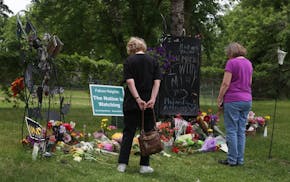Brig. Gen. Jon Jensen of the Minnesota National Guard is participating in a weeklong conference in Tanzania aimed at better coordination of the U.S. military presence in African nations.
It's an initiative with global implications for such things as the rise of terrorism and the threat of pandemic diseases. But given the large African population in Minnesota, what Jensen learns there will have applications here.
Jensen's day job with the Minnesota Guard is director of the joint staff. But for 60 to 90 days a year, he also is one of two deputy commanding generals for U.S. Army Africa, which oversees Army operations in Africa.
The African Land Forces Summit is a gathering of military commanders from 45 African nations to discuss common threats and challenges, and identify working solutions from a regional perspective.
Africa plays a significant role in U.S. military policy, and its influence is expected to grow. The continent's 54 nations include 3,000 ethnic groups and 2,000 indigenous languages. Its 1.2 billion population is expected to grow to 2 billion by 2050.
Portions of the continent also represent significant threats to U.S. national security. The terrorist organization Al-Shabab is in Somalia, ISIS has a presence in Libya, and Boko Haram is in Nigeria and Cameroon. Al-Qaida is resurging in Ivory Coast, Burkina Faso and Mali.
Illicit human, drug, and wildlife trafficking are continuing threats in unsecured areas, not just regionally but globally. There are threats from pandemic and habitual disease and environmental concerns, such as threats to water supplies.
Seventy-five percent of the world's poorest countries are in Africa, and 38 percent of the world's refugees come from Africa.
"I hear people ask, 'Why should we be in Africa?' The question I always ask back is, 'Why shouldn't we be in Africa?' " Jensen said Monday in a telephone interview from Arusha, Tanzania. "It's exactly where the U.S. Army should be engaged with our partner nations."
The commanders at the summit, for instance, shared best practices for combating Boko Haram and will attempt to apply the same practices to confront other terrorist organizations.
"What we learn here, those same terrorist organizations have the same goals," Jensen said. "The population is different, the terrain is different, but we're all trying to get after this together as one team."
As evidence of the continuing threat of instability in Africa, Jensen points out that nine of the United Nations' 16 peacekeeping operations are in Africa. The African Union has four peacekeeping efforts underway.
"We're here to help train and help prepare those countries," he said. "Seeing the necessity of our involvement has been eye-opening."
When he returns, Jensen said, what was learned can be applied locally — not necessarily in terms of sharing intelligence about terrorist activity or security operations, but in fostering connections.
Jensen has asked the commanding general of U.S. Army Africa, Maj. Gen. Darryl Williams, to come to Minnesota to meet with law enforcement officials and share their knowledge. The information will be significant because of large Somali and West African populations in the state.
"In the world that we live in, Minneapolis and St. Paul are having an effect on the U.S. Army in Africa," he said. "You can't just concentrate on this continent. You need to go where the connections are."
Mark Brunswick
612-673-4434

Former MnDOT official approved as Minneapolis public works director

Jury selected for Feeding Our Future trial after unusually long process due to publicity of massive fraud case

911 transcript gives more detail of Sen. Mitchell's alleged burglary
Man shot by deputy in Montrose allegedly said during earlier clash he'd rather die than be arrested

